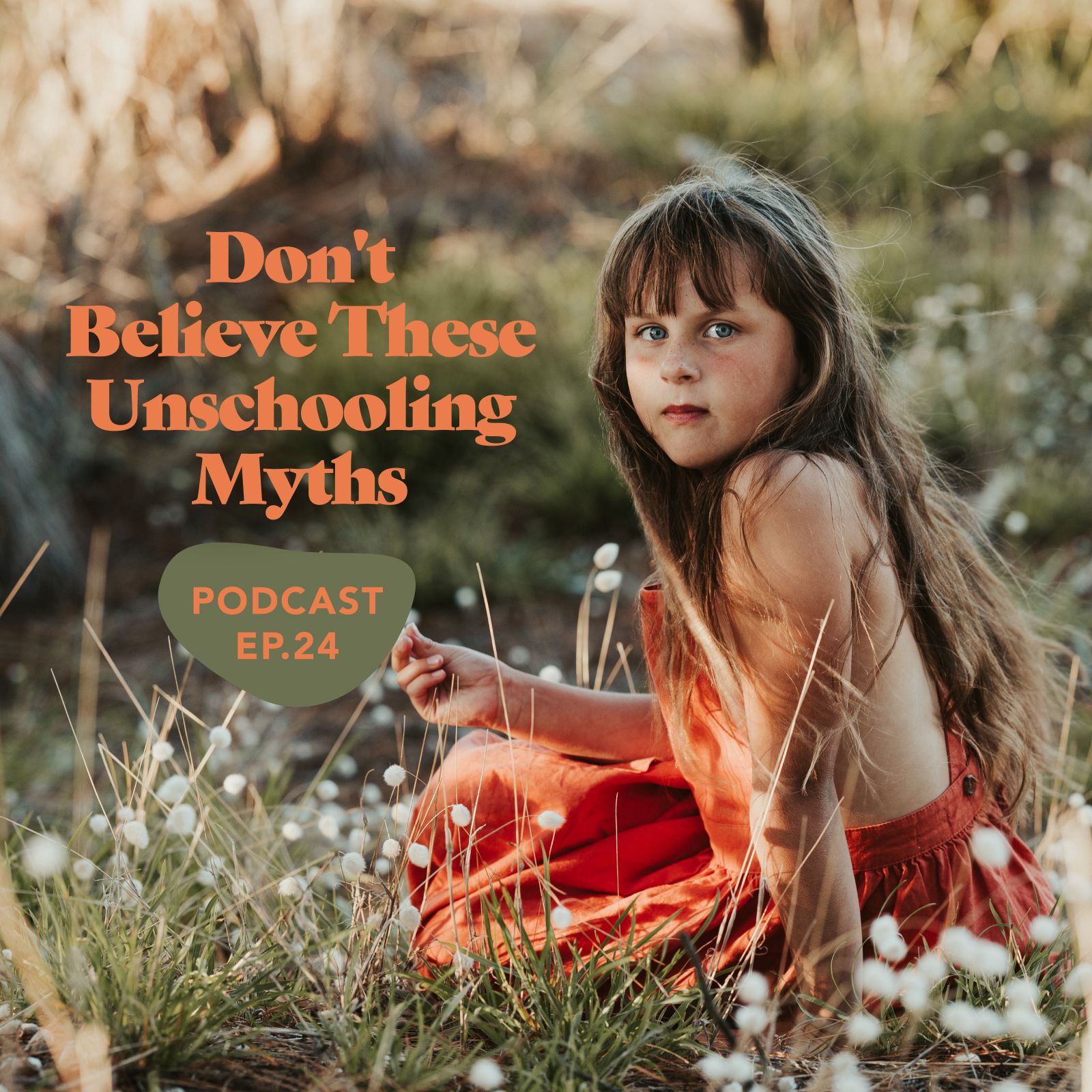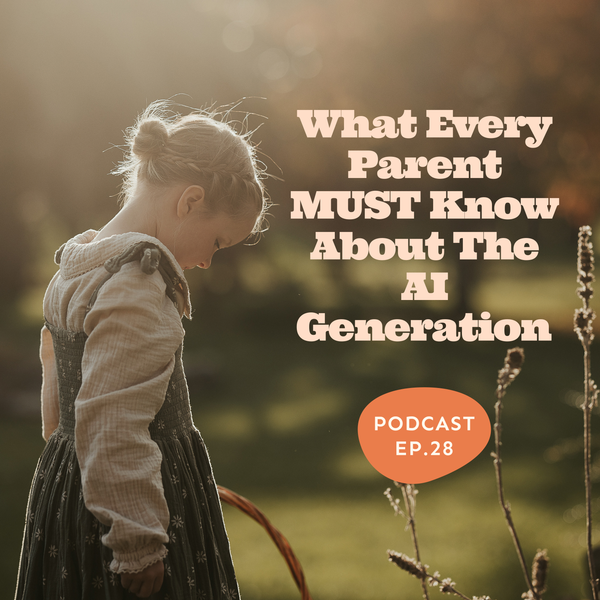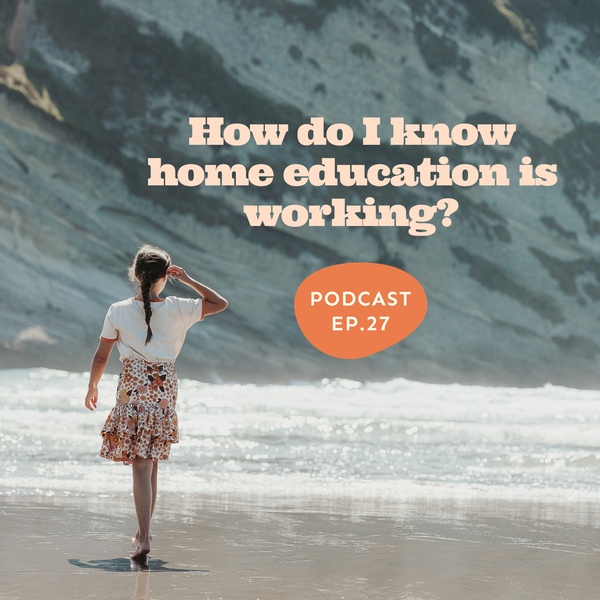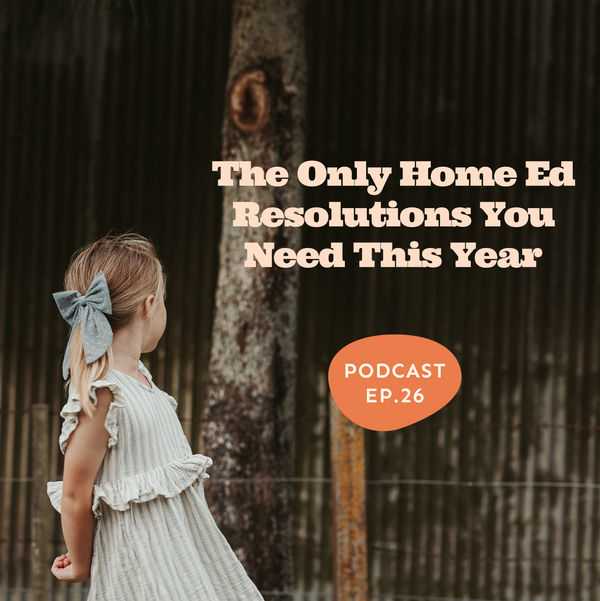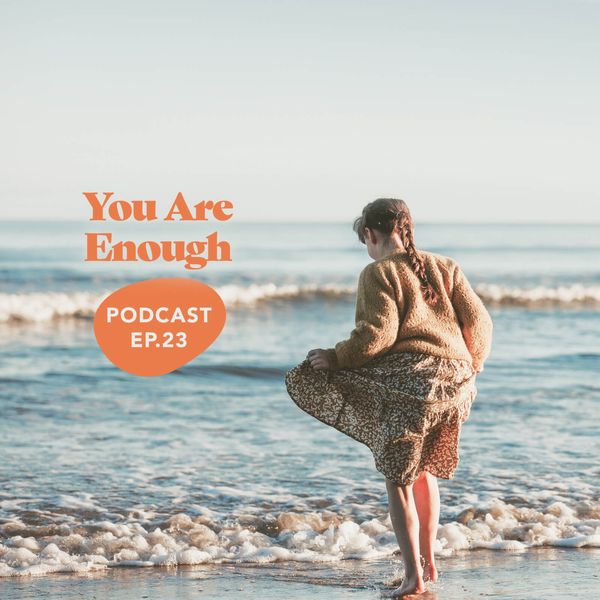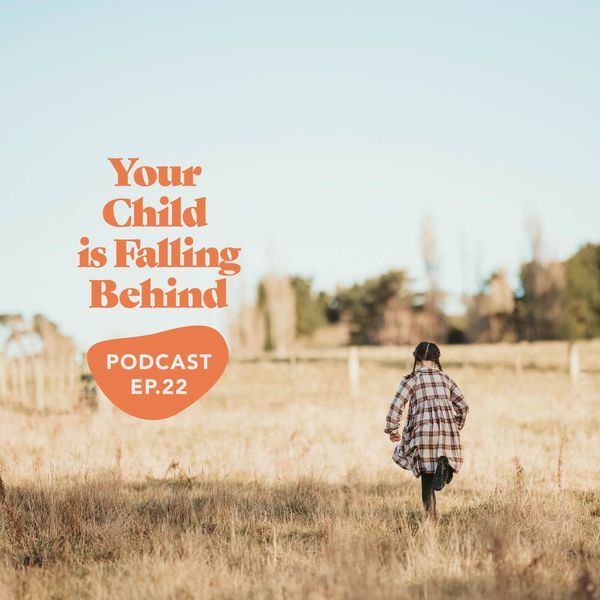In this episode, I spend some time examining three common perceptions that are unique to unschooling:
- That unschooling is 'unparenting'
- That unschooling will create lazy children
- And that unschooling means you have no rules or structure whatsoever
It’s a super interesting discussion that leads us through areas like life rhythms, autonomy and motivation, and regardless of whether you’re unschooling or not I think you’ll find this episode really useful!
These private episodes go even deeper, backed by research, the science of how children learn and grow, and more than a decade of lived home educating experience. Each one is designed to help you rethink, reframe, and recalibrate the way you're walking this path, giving you the confidence to live the version of life you want. The Collection is 23 episodes strong and counting, with over 10 hours of listening available right now.
As a subscriber, you'll also get immediate access to my self-paced course, expert-led masterclasses recordings, five downloadable guides, our school exemption documents, and more 💛
Show Notes
Complete Transcript
INTRO
Helloooo and welcome to the Life Without School podcast, here to help you and your children live the life you want to, not just the one you’re told you should.
I’m Issy, a writer and home educating dad from New Zealand.
You can find my work at starkravingdadblog.com - all of my posts, podcast episodes and more, all designed to encourage, support and reassure anyone walking this road less travelled.
Thank you so much for tuning in to listen today. Alright, let’s get into this episode.
/INTRO
Hello there! It has, again, been some time since we last talked here. I hope you’ve been well and that the first part of the year has been a positive one for you and your family.
We’ve had a particularly busy life season here, across work life and family life, so I’ve been making sure I practice what I preach and have tried not to juggle too many layers at once. But life is settling back into a good rhythm now, so I’m happy to be opening this part of myself back up again.
Before we get into this episode, I just want to share a really quick life update - just in case you’ve missed it across the posts I’ve mentioned it in, and because I’m so excited for what we have planned.
For almost a decade now Kate and I have dreamed about a life season that we spend on the road, together as a family, exploring New Zealand. And towards the end of the last year, we finally purchased a caravan to hook up to our car and started locking in the final pieces of that puzzle. We’ve got solar power and internet running so that I’ll never be disconnected from work, and - if you’ve seen that recent post - you’ll know we’ve now officially set off to roadschool. I’m recording this episode from our caravan, up near the top of the South Island, nestled between a huge national park and a breath-taking series of golden sandy beaches and bays. I’m...pinching myself that we’re actually doing this.
We have no idea how long this adventure will last, we have no planned return date home - all we know is that we have a beautiful country to explore, and a whole lot of nature to immerse ourselves in, so that’s what we’re going to do. Swim in all the lakes, surf all the beaches, walk all the tracks, visit all the little towns you’d otherwise never even know existed...and bank some memories together that I know will last a lifetime. We’re a little bit nervous - you know when you see families spending time living like this, and they have these massive motorhomes or rvs that look huge and capable and...that’s not us. Our setup is not nearly as flash as all that, and - going by our overheating issues, which you’ll have read about if you’ve spotted the new travel diary on my website - definitely not as reliable. Our caravan is a bit older, our vehicle is only really just capable of towing it - along flat ground only, apparently - and we’re squeezing in six humans and a dog.
But those challenges are all part of the journey. If we waited until we had all the best kit, and the best possible setup, I know this chapter would just never happen. So here we are - kind of prepared, and officially underway.
Ok, that’s the life update. Let’s get to today’s episode, where I want to spend some time addressing - and, hopefully, dismantling - three very common myths and perceptions about unschooling specifically. There are many perceptions about home education out there, and I’ve spoken about a lot of them across different episodes, but I’ve never lasered in on unschooling. And I think it would be really useful to, because while a lot of the more general perceptions about homeschooling apply to unschooling as well, there are also some very specific myths that are unique to it. Things you’d probably never be asked even as a homeschooler.
So I want to bubble a few of those up, and hopefully - if you sit somewhere on the unschooling spectrum in your approach to home education - you’ll find this discussion reassuring...but also, tangibly useful when it comes to framing your approach to people who ask you about it. And perhaps, if you know someone who doesn’t quite understand your approach to unschooling, and you’ve found it difficult to really explain why it’s not what they probably think it is, this might be a helpful listen for them too.
It’s also worth saying that even if you don’t see yourself as an unschooled, I think you’ll find this episode interesting. I dig into things that apply to any home educator - in fact, probably any parent.
I also need to say before I start that this is my take on unschooling. These are my views, and my definitions. There are some very clear and firm positions out there on what unschooling should look like in a home. And there is most definitely a spectrum of approaches. So I need to say, right up front, that I don’t sit right down at the radical unschooling end of that. What we’ve done is tried not to think too much about aligning ourselves with any of the typical approaches to home education, and how that’s supposed to look and work, and instead just thought about who our children are. Who we are. How we all best interact with each other, and ourselves, and others, and the world around us. What we all need out of our days to feel good about them.
So rather than fitting neatly into a specific approach, we’ve just naturally picked up different aspects of different approaches. And I think that’s the best way to do home education. Because if you start with the style you want to adopt in your home, you’re putting that first...rather than you and your child. And usually that doesn’t go as well.
As I say all this, I realise there’s probably a whole episode in how I think about the different styles of home education, about their names and definitions, how all of that carries a lot of inherent pressure, and how I prefer to think about it all instead.
But for now, it’s just important for you to know that while our style more closely fits with a typical definition of unschooling, we bring in lots of aspects that a radical unschooler probably wouldn’t.
And that’s kind of the point of this episode. Breaking down the expectations and perceptions that come with a label.
Right, let’s not waste any more time - we’re getting into it.
MYTH ONE: Unschooling means Unparenting
If you tell someone that you unschool your children, they will probably picture a lifestyle without any boundaries. They’ll picture a childhood spent in a state of almost complete autonomy, one where the parents have chosen not to imprint anything of themselves on their children, and have fully stepped back.
Unschooled children - the perception holds - make all their own rules. What they eat, when they’ll eat it, when they will and won’t sleep, what they do with their time - with literally every single second of it - what they wear, whether or not they brush their teeth, how they speak to and treat other people...
Every single life decision - from big moments to small - is up to the child. They are in total control of their life.
Now, underneath all of these assumptions is one single idea where all the perception problems with unschooling begin - that this lifestyle is just a lazy version of parenting. That it is more like unparenting.
Taking a lot of life’s responsibilities off your own shoulders, and leaving it with your kids instead.
But there are two big problems with this perception:
The first is that even if you do approach unschooling in this way, it’s not lazy parenting. I know unschooling parents who give their children a lot more autonomy and control than Kate and I do, but they’re still very involved. They’re still very invested. It’s applied in different ways than us, it manifests differently, but it doesn’t mean it’s lesser. And it certainly doesn’t mean it’s lazy.
But it’s the second problem - and the one I really want to drill down into - is this: lots of unschooling families operate home environments that do have rules, and guidelines, and expectations. Let’s use me, and my family, as a classic example of this. You definitely couldn’t define us as traditional homeschoolers, so that’s why we use the unschooling label.
But we expect our children to brush their teeth twice a day, and we stay on them to make sure it happens.
We expect our children to make their beds in the morning, and keep their rooms tidy.
We expect our children to walk the dog, and help with the dishes, and help fold the laundry.
And it doesn’t end with mechanical, day-to-day things like this either.
We expect our children to work with us to build the muscle of being in the moment, but also to think about their future. To, develop an ability to live intentionally.
We expect our children to try certain things, even if they think they won’t enjoy them, just in case they do.
We expect our children to commit time and energy to learning about and maintaining their physical health and wellness, to ensure they have the best shot possible at a long, healthy life. One they can enjoy to the fullest along the way.
But here’s the thing. Expectation is a two-way street. And to me, this is the area where an unschooling approach diverges the most from traditional parenting, and traditional, formal education. And where it diverges for firmly from lazy parenting.
If I have reasons for expecting certain things from my children, then I should expect to have those reasons questioned. To have to justify them, with real, honest answers. That’s not rudeness or petulance, that’s curiosity and open dialogue.
If I expect my child to listen to my advice, then I should expect them to give their thoughts in return and have me listen. That’s not talking back - that’s expressing, and understanding how to develop, their opinion.
If I expect my child to keep their room tidy, then I can expect to have them hold me to account if mine’s always a mess. That’s not being obnoxious and petty - it’s maintaining the standard in the home that we’ve all agreed makes us feel good.
If I expect my child to brush their teeth twice a day, then I should expect to be able to give a very clear answer to why that’s so important.
If I expect my children to be active, use their bodies regularly, and eat a mostly healthy diet, then I should expect to be questioned if I sit at a desk all day and then flop onto a couch with a bowl of ice cream every night.
And if I expect my children (or child, because only my 15 year old has a phone so far) to monitor and manage their use of technology and screens in very intentional ways, then I should expect to have that thrown right back at me when I wander around the house looking down at my phone after sitting at a computer all morning.
See, what unschooling does - in our home, anyway - is create a two-way street of communication. Not just from an educational standpoint, but in every area of life.
And when you start picturing how that must play out day to day - then it becomes very obvious that the approach we’re taking as unschooling parents requires a LOT of effort. Probably even more than an approach where we just get to define a program or pick a curriculum and then have the children follow it. There’s a huge amount of conversation, and communication, and reinforcing, and reasoning.
So does unschooling really look like unparenting? Is it lazy? Is it...disengaged, irresponsible, or even - a word I’ve heard used - negligent? Not in our home. And not in the homes of any of the unschoolers we know.
MYTH TWO: Unschooling will create lazy children
Following on from the lazy parenting perception is the what seems like obvious result of that - that unschooling will create lazy children. Children who then grow up to be lazy adults. That the autonomy they’re given will lead to opting out of much of life, which will lead into a cycle of not doing a whole lot, becoming unmotivated, doing even less, and so on...until our child gets to a complete low point of energy and effort.
Except that’s not what happens when you give someone autonomy. The irony is that a hit on motivation is actually much more likely to come when you’re continually told what to do, how to do it, and when to have it done by.
There are many ingredients that go into developing drive or motivation - or, to keep with the perception - developing a non-lazy child - and we’ll talk about some of the those in the next section.
But for now, I want to laser in on autonomy.
Because this is one of our key starting ingredients. In fact, autonomy is so important to human development that we really should see it as a basic human need.
So why is autonomy such a key ingredient in developing internal drive and motivation? Because before all that, it’s a critical aspect in the development of self-regulation. Which, in turn, is an incredibly important executive function used for managing not just our behaviours, but also our thoughts and our emotions. It’s well-documented that setting and achieving personal goals - that we have control over - makes us feel happier, better about our lives, and more motivated to pursue more challenges.
Well, self-regulation is the car that takes us on that journey. But autonomy is the key that starts the engine.
If you’ve ever heard of self-determination theory, that’s what all this ties back to. It’s an area of research in human psychology that started back in the 1970s, looking at the effects and differences between external and internal motivations, and has since developed into a much deeper and wider area of research. Which makes sense - the practical applications of self-determination theory - of developing abilities to make choices and manage our lives - are immense.
Just to really draw a line under the difference this can make by the time we get to adulthood, let me give you a workplace example. A project deadline has gone past - a project deadline you owned - and now it’s had some negative flow-on effects into other areas of the business. Not completing your project has impacted you, and the people around you.
Now, first of all, that can happen to anyone. For lots of reasons. But it’s how we respond to that scenario where the difference is:
First, let’s say you’ve developed a high level of self-determination: You are more likely to recognise that you have made a mistake, you will believe you can do something to fix that mistake, and you will take action right now.
Now, let’s say you haven’t: you are more likely to spend time finding someone else to blame for your mistake. Or, to find excuses. And - this is the key thing - you are less likely to do something about it. You won’t feel motivated to fix the issue, and you’ll feel a bit helpless.
And this is why - without going into toooo much depth on all this here - it bears repeating: that among all that research, autonomy is talked about as being a basic psychological need.
You’ve probably heard me cite one of the many experiments relating to this in a previous episode - the one with the kids in the classroom, and their motivation to draw or not draw depending on the incentive they were offered or not offered - and that’s related to what we’re talking about here. If we bring in external control factors - even if it’s rewarding something that a child is already doing because they want to - we undermine autonomy, and motivation decreases.
So imagine what having no autonomy, and no opportunity to pursue those internally-developed ideas and plans in the first place, can do to us.
Now, back to the perception: that giving unschooled children a level of autonomy and control over their lives will automatically make them lazy.
Well, no. That simply can’t be the case. Because it is a clear, peer reviewed, research-backed fact that autonomy will always beat control in the development of motivation.
What should worry us more - a whole lot more - is the number of children from whom we’re taking autonomy away.
MYTH THREE: Unschooling means no rules, structure or routines whatsoever.
This - again - illustrates the big problem I have with labels. Because when you say you’re unschooling, this is what people picture. A lifestyle without rules, without guidelines, without routines, without structure.
And - again - there are plenty of unschooling families who live that way. But there are also plenty of unschooling families - like us - who don’t.
And the reason for that - to Kate and I, at least - is because there’s a fascinating paradox sitting deep in an intersection between stucture and freedom.
We’ll dig into this more in a second, but let me start by using a real world example to illustrate what we’re talking about here.
The lifestyle we’re personally living right now - out on the road, with no set dates for when we need to be anywhere and no set places we have to go - might sound like the absolute essence of control and freedom.
But guess what - without some structure, without some rules, without routines and discipline, this lifestyle would quickly unravel at the seams.
When we first arrive at a new camp site, everyone has their jobs to do. We all know we have a routine to get through, or there’ll be consequences. If we forget to pull the extra handbrake on for the caravan, chock the wheels, or make sure the stabilisers are properly down and everything is level, we’ll have trouble. If we turn the power on before we’ve filled the water tank and run the pump, our hot water cylinder will fry itself. If the grey water tank isn’t properly set up before we start using the kitchen sink, there’ll be a real mess to wake up to outside tomorrow.
The list is a hundred things long. And it’s not just when we set up or pack down to move. In a caravan, there’s always a tank that’s almost full that shouldn’t be, or a tank that’s almost empty that shouldn’t be. There’s always something you need to organise or move to get to another thing you want to organise or move.
But that running list we have of jobs that everyone needs to take on, or contribute to - the structure and routine it provides us, and the discipline we each have to apply to it - is what allows us the feeling of control and freedom we generally have.
Without those routines, and without that discipline, things would overflow, or break, or short out, or fall apart. Those sorts of things cost time, energy and money. They cost you freedom, and they cost you control.
There’s a famous Navy SEAL that loves to talk about this stuff - his name’s Jocko Willink - and, just as a very quick disclaimer, I don’t know a lot about this guy at all - other than the fact he takes a photo of his watch every morning and posts it to Twitter just to prove he’s up and doing at 4:30am. But from afar, this guy looks like one of the most disciplined people imaginable. And he’s achieved a lot in his life because of it.
Well he talks about this paradox. About the very interesting relationship between discipline and freedom.
So I want to quote this guy directly here:
Jocko: “While Discipline and Freedom seem like they sit on opposite sides of the spectrum, they are actually very connected. Freedom is what everyone wants — to be able to act and live with freedom. But the only way to get to a place of freedom is through discipline. If you want financial freedom, you have to have financial discipline. If you want more free time, you have to follow a more disciplined time management system. You also have to have the discipline to say “No” to things that eat up your time with no payback—things like random YouTube videos, click-bait on the internet, and even events that you agree to attend when you know you won't want to be there. Discipline equals freedom applies to every aspect of life: if you want more freedom, get more discipline.”
I really buy into this idea, mainly because it’s what I’ve always felt in my gut before I ever started researching it.
But let me make this whole thing a little more abstract so that it’s obvious how this can apply to anyone, with any lifestyle, from anywhere:
Life is a journey, right? We’d all agree with that. We set off on it when we’re born, and it ends when we die. And I don’t think many people go through life hoping nothing will ever happen. Most of us want to go forward in meaningful ways, however that looks for each of us.
Well, do we go forward by just standing there? Or is it only when we make a decision to move that we start seeing new and interesting things? And if you really want to make progress, what would you do? Well, you’d start finding things to attach some personal goals to. You’d start making plans, and preparing yourself as best you can to achieve them. You’d put in effort. You’d take the time to check your bearings, make sure you were still happy with your planned destination, that you’re still going in the direction you want, and you’d push on. There might be times where you slow down, and just meander, or even stop. There would be times where you change direction entirely, based on new information you add to your map.
The point is that even in this loose analogy for an intentional life, for a life well lived, there is planning, and structure, and routine, and discipline. Not as restrictive things, but as tools to discover more. Tools that bring more control, and more freedom.
Now, I want to draw all this firmly back to an unschooling lifestyle by giving you an example of this kind of thing in action. Just to really draw a line under the point here:
I talk a lot about this idea of helping our children discover what they want to get better at, or learn more about, and then helping them towards it. Coaching them towards it. Well, one of the key ways we can do that is by helping them understand the focus and discipline they’ll need to develop and flex to get there. That things don’t just happen by chance. That to get better at something, sometimes you will need to make a plan around it. Sometimes you will have to apply some structure to it. Sometimes you will have to give yourself some rules and guidelines to operate within to have the best chance of success. And - more than sometimes - you will need to apply some discipline to get there.
Whatever that particular thing is - whatever that interest is - that can change, that doesn’t matter. That’s not the point. What matters is that while it’s an interest, it gets the attention they would dearly wish they had given it if their future self looked back on them having not.
Do you know how freeing it is, how in control you feel, when you develop mastery in something? Have you ever felt that? Or, even when you just make small bits of progress in something challenging, or something you want to get better at.
Mastery is a whole other topic for a different time - a whole episode, in fact - but I’ll say two things about it to sum up here:
1) Being given the space to pursue mastery in things we’ve chosen to dedicate time to should be as much of a basic human right as being fed, and
2) Mastery hardly ever exists without there first being some structure, some routines, some rhythms, and a whole lot of discipline.
CLOSING MUSIC
Today we have found some fascinating intersections in some unexpected places. Intersections between autonomy, and structure, and guidance. Intersections between control and freedom. Intersections that are critical balance points for human nature, and - in my opinion - a life well lived.
To me, this is the essence of an unschooling approach. The ability to find those intersections for our children, wherever and whatever they are, and help them find their own balance points within them.
I have lost count of the times I’ve heard that unschooling is just lazy parenting. That unschooling will lead to lazy children. That unschooling is just an unstructured, undisciplined mess.
If you don’t think of yourself as a traditional homeschooler, but not a radical unschooler either, then I’m sure you will have heard the same.
I hope today’s episode has given you some interesting things to reflect on, and to maybe bank as answers if these sorts of things are ever asked of you.
And if you’re listening in because someone in your life has sent you this episode to help you understand their lifestyle, I hope I’ve been able to give you a different perspective. And maybe some food for thought.
Thank you so much for tuning in to listen, and I’ll hopefully see you back here soon.
Bye for now.


